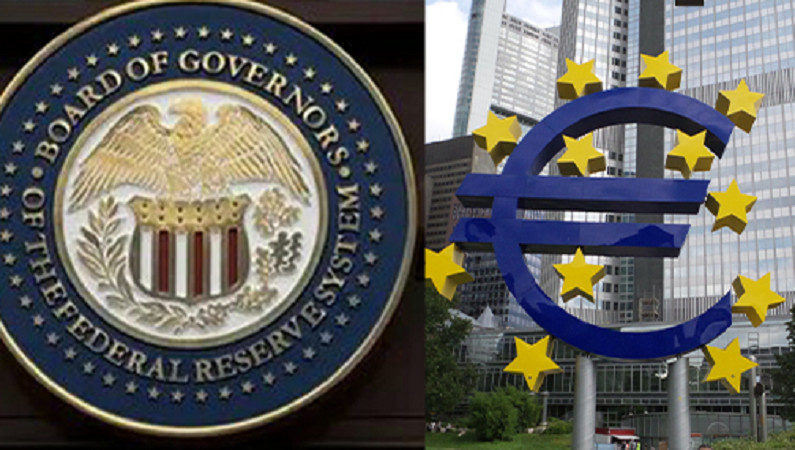Germany's public debt fell and spreads between the core and periphery tightened on Wednesday. Investors were expecting a slight increase in yields in the short term after last week's European Central Bank meeting spurred repricing, so the market stabilized.
The dynamics of the markets makes us doubt the forecasts. Private traders become more active
German short-dated yields were close to its highest in more than a decade, with the two-year yield dropping 1.5 basis points (bps) to 2.50%. On Tuesday, it reached 2.51%, the highest level since October 2008. Prior to the ECB meeting, it was around 2.2%. Germany's 10-year Bund yield, the eurozone's benchmark, fell 2 basis points to 2.28%.
ECB euro short-term rate (ESTR) forwards price in the depo rate to peak at around 3.4% in the summer of 2023, down from about 2.8% before last week's ECB meeting.
Italy's 10-year government bond yield also fell 10 basis points to 4.37%, and the spread between Italian and German 10-year bond yields tightened to 209 basis points. It widened from 190 bps to 220 bps after the ECB meeting.
The Bank of Japan (BOJ) shocked markets on Tuesday with a surprise tweak to its bond yield control that allows long-term interest rates to rise further, but analysts expect limited spillover effects. With Japanese buyers already overweight in U.S. dollars and other currencies, the BOJ's action will not have the same effect that it did a month earlier.
Of course, buyers are going to use it to buy yen and Japanese bonds as domestic yields rise. By extension, the domestic and foreign bond markets adjustment is likely to be fairly orderly. The foreign exchange market, though, looks like it will still fall victim to such a change.
After last week's ECB meeting, German real yields have been in positive territory. The 10-year inflation-linked rate was at 0.12%. It reached its highest level since February 2014 at 0.273% on October 21.
The targeted longer-term refinancing operations (TLTRO) repayments will settle today. Euro zone banks are set to repay early another 447.5 billion euros ($474.62 billion) in multi-year ECB loans.
In theory, this should support the transmission (of the money market) into the ECB's new 2% depo rate.
Still, a more general analysis still shows that investors are concerned about more public spending in 2023 to fight the energy crisis. This will undermine the plans of the ECB, which has promised further interest rate hikes and said it would reduce its bond holdings in March. As a result, we may well reach the plateau of recession.
These, sometimes unconvincing assumptions by analysts and traders, don't hurt the markets that much on their own. But they do affect how central banks set the value of money today, directly altering future activity. They influence indirectly - by reacting to the banks' actions and giving feedback.
And then financial markets, in turn, feed off both today's policy decisions and official forecasts, shaping futures prices based on them, even though many central banks have decided this year to abandon explicit forecasts as a policy tool.
This all risks turning into a whirlpool of speculation. It is already obvious that the Federal Reserve and the ECB have missed their estimate of inflation... but not the coming recession. The market simply didn't want to fall too low, taking advantage of the fact that individual countries' finance ministries rushed to put a cushion on manufacturers and households.
Because of the often unreadable international policies that make the calculation of direct numbers so unreliable, most traders' biggest fear is that this leads to serial policy errors that encapsulate more macroeconomic and market volatility than we have seen in decades.
Yes, central banks at least talk about it openly and say how they get it wrong - in part to dissuade the public from thinking the forecasts are chiseled in stone.
How many red flags are analyzed in different ways underscores how wrong the forecasts have been over the past 20 years, as well as getting estimates from policymakers about whether the uncertainty associated with their calls is higher or lower than now, and if the risks to that forecast are biased one way or another.
Obviously, we should be very cautious of assurances from the Fed, the ECB, the central banks of England and Canada that they plan to return to the "standard situation" by the end of 2023, when they will start whining that they cannot make inflation rise. Russia, cut off from the global economy, with its energy and fertilizers, Ukraine, a major grain supplier, with the uncertainty of the spring sowing campaign due to its conflict with Russia, China with its cunning plans and the global recession are the four horsemen of the apocalypse, each of which could derail the long-term plans of all central banks combined, and each individually.
In the meantime, it makes sense to think about safe havens in the form of gold and Bitcoin. Bitcoin has fallen well and will probably fall all next year. This is a good time to invest in a cheap instrument. Gold, on the other hand, has already started its rise, and that door of opportunity is already slamming shut. The saddest segment is medium-term trading, which may not justify investors at all. Among other things, this means that traders will tend to trade on their own, preferring short timeframes and flexible strategies, but the investors of investment funds risk more than ever.





















